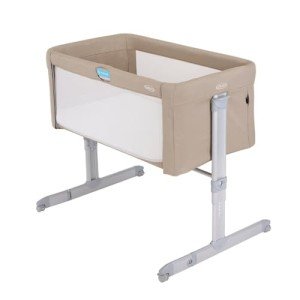This Is The Ultimate Guide To Bedside Cot For Close Bonding
Bedside Cot for Close Bonding: Enhancing Parent-Child Connection
Introduction
The arrival of a newborn is a special occasion that's accompanied by a wealth of jubilant emotions and newly found obligations. As parents browse the myriad of choices they deal with, one essential consideration is where their baby will sleep during those early months. A bedside cot, also referred to as a co-sleeper, has actually become a progressively popular choice among caretakers looking for to promote close bonding with their infants while ensuring safe sleep practices. This article checks out the advantages of utilizing a bedside cot, its influence on bonding, safe sleeping practices, and vital considerations for parents or guardians.
- * *
What is a Bedside Cot?
A bedside cot is a kind of crib that is securely connected to the side of the adult bed, enabling parents to have their newborn close at hand throughout the night. This setup allows for easy accessibility without having to rise, therefore enhancing nighttime feeding and relaxing experiences.
Types of Bedside Cots
Attached Co-Sleepers: These models connect straight to the moms and dad's bed and provide a secure sleeping environment for the infant while preserving easy access for feeding and comfort.
Freestanding Bedside Cots: Operated as a separate system but put nearby to the bed, these cots provide private sleeping locations while still allowing for closeness.
Convertible Bedside Cots: These versatile models can adapt as the child grows, transforming from a cot to a toddler bed or play area, extending their functionality.
- * *
Advantages of a Bedside Cot for Close Bonding
The use of a bedside cot not only guarantees benefit but also supports a special bond between parents and their children. Here are some essential advantages:
Facilitates Immediate Response: Proximity allows caretakers to react swiftly to the baby's requirements, whether for feeding, relaxing, or comfort, therefore establishing security and trust.
Promotes Breastfeeding: Nighttime breastfeeding becomes easier when the baby is within reach, assisting in a more natural feeding regimen.
Reinforces Emotional Connection: Close physical presence can improve the psychological bond through skin-to-skin contact and mother-infant interactions during nightly awakenings.
Motivates Sleep Synchronization: Being near each other can help regulate the infant's sleep patterns to closely align with those of the parents.
Lessens Sleep Disruption: With the baby nearby, parents may sleep much better, knowing they do not have to leave their bedside to attend to their baby.
Table 1: Benefits of Using a Bedside Cot
Advantage
Description
Immediate Response
Quick access to the baby for feeding or soothing.
Promotes Breastfeeding
Easier to breastfeed in the evening due to distance.
Enhances Emotional Connect
Fosters emotional bonds through frequent contact.
Motivates Sleep Synchronization
Assists both moms and dad and baby to establish integrated sleep patterns.
Decreases Sleep Disruption
Decreases nighttime awakenings for parents.
- * *
Safe Sleep Practices
While bedside cots supply different benefits, parents should make sure the baby's sleep environment sticks to safety protocols. Here are some essential security ideas:
- Firm Mattress: Ensure the cot has a company bed mattress that fits comfortably to prevent any gaps where the baby might become caught.
- Sids Prevention: Place the baby on their back to sleep, which pleases the most crucial suggestion to avoid Sudden Infant Death Syndrome (SIDS).
- Keep Bedding Minimal: Use a fitted sheet and keep other bed linen to a minimum to avoid suffocation threats.
- Maintain Distance: Ensure the cot is firmly connected to your bed, reducing the risk of falls.
- Limit Soft Objects: Keep soft toys, pillows, and blankets out of the cot to supply a safe sleeping environment.
Table 2: Safe Sleep Practices for Bedside Cots
Safety Tip
Description
Firm Mattress
Use a firm mattress that fits snugly into the cot.
SIDS Prevention
Always place the baby on their back to sleep.
Keep Bedding Minimal
Limit bedding products to prevent suffocation risks.
Keep Distance
Ensure the cot is securely protected to the adult bed.
Limit Soft Objects
Eliminate soft toys and pillows from the sleeping location.
- * *
Considerations Before Choosing a Bedside Cot
Selecting the best bedside cot requires deliberation and factor to consider of various elements:
- Size: Ensure the cot fits conveniently along with your bed without jeopardizing space.
- Ease of Use: Look for models that are user-friendly and simple to operate, particularly during nighttime feeding.
- Security Features: Safety straps and locking mechanisms should remain in location to prevent accidental detachment.
- Material Safety: Choose non-toxic, baby-friendly materials with certified security standards.
Regularly Asked Questions (FAQs)
1. Is it safe to use a bedside cot?Yes, bedside cots can be safe when correctly connected to the adult bed and used according to security guidelines.
2. At what age can I transition my baby to their own room?Typically, health experts suggest transitioning babies to their own room in between 6 months to 1 year, but every family scenario may differ.
3. Just how Side Sleeping Crib does a bedside cot require?Bedside cots vary in size; it's vital to ensure enough space next to your bed for correct installation and access.
4. Can a bedside cot be utilized for over night trips?Some models are portable and designed for travel, making them appropriate for overnight journeys or holidays.
5. How do I clean a bedside cot?Refer to the manufacturer's guidelines for proper cleansing instructions to keep health and safety.
- * *
A bedside cot serves as an important tool for cultivating close bonding between parents and their infants. By making sure easy access during nighttime, promoting breastfeeding, and making it possible for instant responsiveness, a bedside cot boosts the parent-child relationship during those essential early months. When combined with safe sleep practices, it provides an environment that nurtures psychological advancement while focusing on security. For any new parent, buying a quality bedside cot can result in a beautiful co-sleeping experience filled with bonding opportunities and relaxing nights.
